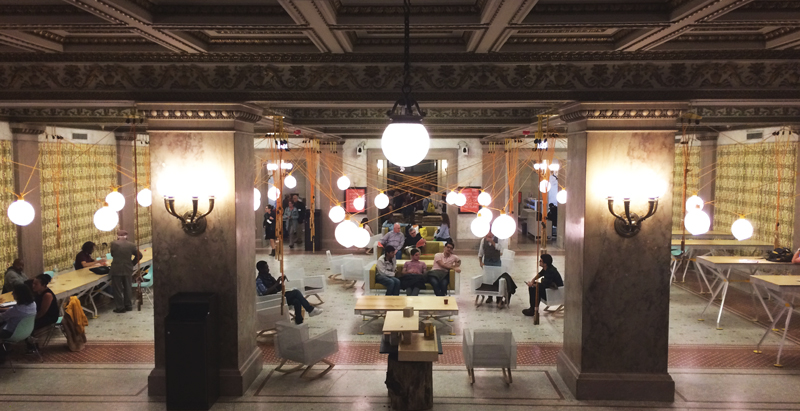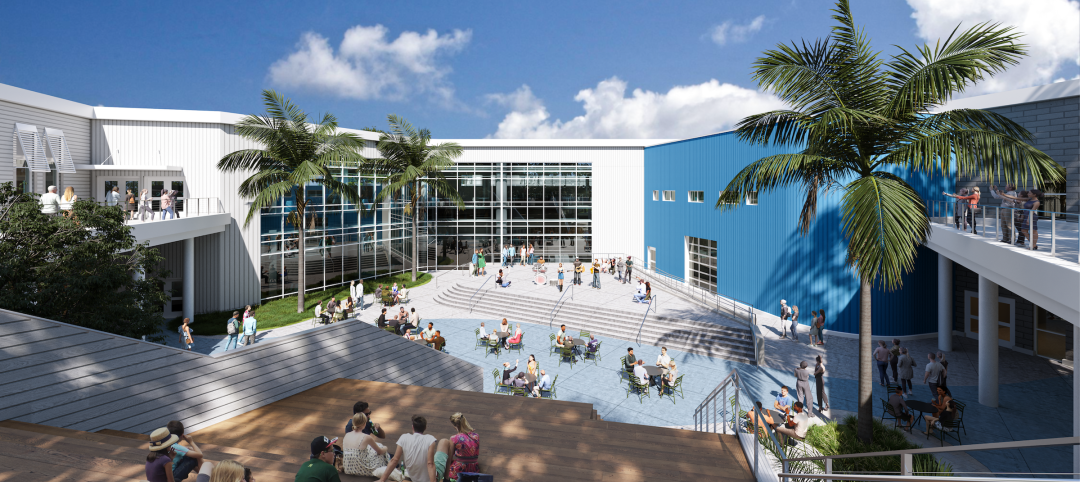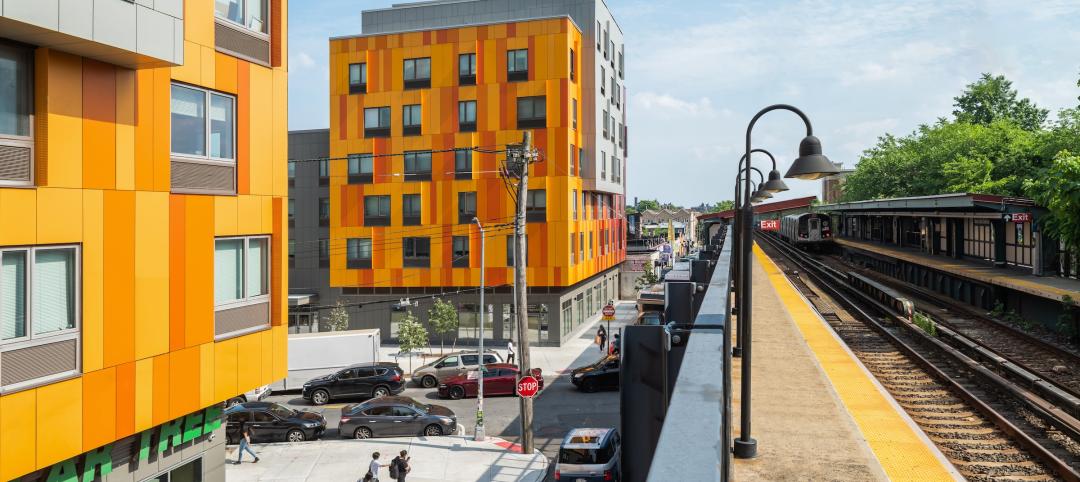It’s been nearly three weeks since the Chicago Architecture Biennial kicked off on Oct. 3. Reviews have been generally positive, from the Chicago Tribune’s Blair Kamin calling it a “mixed bag” with a vaguely titled, though well executed, theme, to The Wall Street Journal’s Julie V. Lovine, writing that the inaugural event has “just the right proportion of earnest effort to razzle-dazzle.”
But as Lovine puts it, the event’s title, “The State of the Art of Architecture” is indeed fitting, as it “is a pulse-taking of contemporary architecture as it could be—creative responses that suggest solutions to some of the intractable, quotidian challenges of our times.”
One thing that stood out for BD+C was the experimentation with new building materials and methods, drafted by both established and up-and-coming talents in the architecture world as a response to today’s environment, societal behavior, and business demands. Here are some highlights:
1.Dried Leaves in “The S House” by Vo Trong Nghia Architects
The Vietnamese firm is well known for incorporating nature into its projects, weaving green space in and out of the built area such as seen in their multifamily residential project, and designs for FPT University’s administrative and classroom buildings.
To the Chicago Architecture Biennial, Vo Trong Nghia brings another sustainable concept, The S House, which aims to make easy to build affordable homes that can be sheathed in locally sourced, renewable material.
According to Dezeen, the design was first released in 2012 and has been refined ever since. Each home should cost around $1,000 and can provide relief in countries struck by natural disasters.
The frame is a galvanized steel structure where each components is 130 pounds or less, and can be erected in under three hours. The frame is then sheathed in dried leaves, as displayed at the Biennial, but any other material that is locally available can substitute. The house is one of four full-sized houses on display at the event’s main exhibition in the Chicago Cultural Center building.
2. Cross-Laminated Timber in “Chicago Horizon” by Ultramoderne
The Rhode Island-based architecture firm Ultramoderne was the winner of the biennial’s Chicago Pavilion competition.
Dezeen reports that the Chicago Horizon pavilion was built “using the largest lengths of timber that can be shipped across North America.”
The structure is constructed near the Museum Campus by Lake Michigan, offering views of the Chicago skyline from the south east. The entire structure was built using cross-laminated timber.
The design uses cues from legendary German architect who later made Chicago home, Ludwig Mies van der Rohe.
3. Wooden Pallets in Low-Cost House by Tatiana Bilbao
Using wooden pallets to create a rustic, industrial look in interior design has been gracing the pages of design websites for a while, but Mexican architect Tatiana Bilbao is giving the shipping tool a greater purpose.
The architect’s low-cost home design relies on the lightweight yet sufficiently sturdy pallets to establish rooms. They can be shifted around as the household grows or shifts needs.
4. Rocks and Strings in “Rock Print” by Gramazio Kohler and Skylar Tibbits
Towering over attendees in the Chicago Cultural Center is the Instagram-ready, three-legged structure designed by Gramazio Kohler Research of ETH Zürich and Skylar Tibbits of MIT’s Self-Assembly Lab.
According to Archdaily, the structure was created by robotic hands that laid down strings, and between the layers of strings, rocks were placed by hand. A video is the best way to explain this:
The tower of rocks isn’t just an artistic sculpture. As The Wall Street Journal’s architecture writer Julie V. Iovine puts it, “the process has untold potential for sustainable and economic construction using the cheapest materials imaginable.”
Related Stories
Office Buildings | May 20, 2024
10 spaces that are no longer optional to create a great workplace
Amenities are no longer optional. The new role of the office is not only a place to get work done, but to provide a mix of work experiences for employees.
Mass Timber | May 17, 2024
Charlotte's new multifamily mid-rise will feature exposed mass timber
Construction recently kicked off for Oxbow, a multifamily community in Charlotte’s The Mill District. The $97.8 million project, consisting of 389 rental units and 14,300 sf of commercial space, sits on 4.3 acres that formerly housed four commercial buildings. The street-level retail is designed for boutiques, coffee shops, and other neighborhood services.
Construction Costs | May 16, 2024
New download: BD+C's May 2024 Market Intelligence Report
Building Design+Construction's monthly Market Intelligence Report offers a snapshot of the health of the U.S. building construction industry, including the commercial, multifamily, institutional, and industrial building sectors. This report tracks the latest metrics related to construction spending, demand for design services, contractor backlogs, and material price trends.
K-12 Schools | May 15, 2024
A new Alabama high school supports hands-on, collaborative, and diverse learning
In Gulf Shores, a city on Alabama’s Gulf Coast, a new $137 million high school broke ground in late April and is expected to open in the fall of 2026. Designed by DLR Group and Goodwyn Mills Cawood, the 287,000-sf Gulf Shores High School will offer cutting-edge facilities and hands-on learning opportunities.
Adaptive Reuse | May 15, 2024
Modular adaptive reuse of parking structure grants future flexibility
The shift away from excessive parking requirements aligns with a broader movement, encouraging development of more sustainable and affordable housing.
Affordable Housing | May 14, 2024
Brooklyn's colorful new affordable housing project includes retail, public spaces
A new affordable housing development located in the fastest growing section of Brooklyn, N.Y., where over half the population lives below the poverty line, transformed a long vacant lot into a community asset. The Van Sinderen Plaza project consists of a newly constructed pair of seven-story buildings totaling 193,665 sf, including 130 affordable units.
K-12 Schools | May 13, 2024
S.M.A.R.T. campus combines 3 schools on one site
From the start of the design process for Santa Clara Unified School District’s new preK-12 campus, discussions moved beyond brick-and-mortar to focus on envisioning the future of education in Silicon Valley.
University Buildings | May 10, 2024
UNC Chapel Hill’s new medical education building offers seminar rooms and midsize classrooms—and notably, no lecture halls
The University of North Carolina at Chapel Hill has unveiled a new medical education building, Roper Hall. Designed by The S/L/A/M Collaborative (SLAM) and Flad Architects, the UNC School of Medicine’s new building intends to train new generations of physicians through dynamic and active modes of learning.
Sustainability | May 10, 2024
Perkins&Will’s first ESG report discloses operational performance data across key metrics
Perkins&Will recently released its first ESG report that discloses the firm’s operational performance data across key metrics and assesses its strengths and opportunities.
MFPRO+ News | May 10, 2024
HUD strengthens flood protection rules for new and rebuilt residential buildings
The U.S. Department of Housing and Urban Development (HUD) issued more stringent flood protection requirements for new and rebuilt homes that are developed with, or financed with, federal funds. The rule strengthens standards by increasing elevations and flood-proofing requirements of new properties in areas at risk of flooding.

















